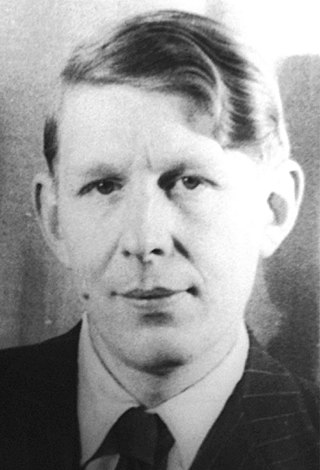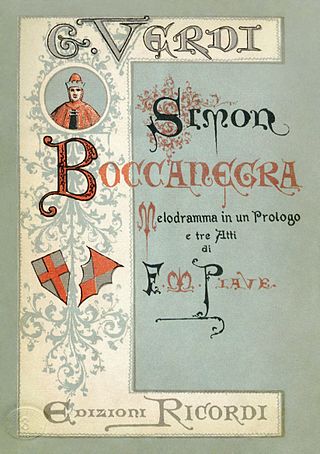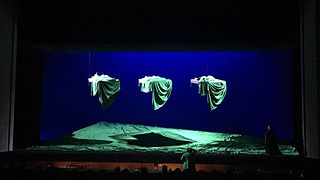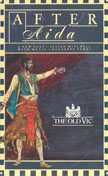Related Research Articles

Wystan Hugh Auden was a British-American poet. Auden's poetry was noted for its stylistic and technical achievement, its engagement with politics, morals, love, and religion, and its variety in tone, form, and content. Some of his best known poems are about love, such as "Funeral Blues"; on political and social themes, such as "September 1, 1939" and "The Shield of Achilles"; on cultural and psychological themes, such as The Age of Anxiety; and on religious themes such as "For the Time Being" and "Horae Canonicae".

Falstaff is a comic opera in three acts by the Italian composer Giuseppe Verdi. The Italian-language libretto was adapted by Arrigo Boito from the play The Merry Wives of Windsor and scenes from Henry IV, Part 1 and Part 2, by William Shakespeare. The work premiered on 9 February 1893 at La Scala, Milan.

Love's Labour's Lost is one of William Shakespeare's early comedies, believed to have been written in the mid-1590s for a performance at the Inns of Court before Queen Elizabeth I. It follows the King of Navarre and his three companions as they attempt to swear off the company of women for three years in order to focus on study and fasting. Their subsequent infatuation with the Princess of France and her ladies makes them forsworn. In an untraditional ending for a comedy, the play closes with the death of the Princess's father, and all weddings are delayed for a year. The play draws on themes of masculine love and desire, reckoning and rationalisation, and reality versus fantasy.

Simon Boccanegra is an opera with a prologue and three acts by Giuseppe Verdi to an Italian libretto by Francesco Maria Piave, based on the play Simón Bocanegra (1843) by Antonio García Gutiérrez, whose play El trovador had been the basis for Verdi's 1853 opera, Il trovatore.

The Rake's Progress is an English-language opera from 1951 in three acts and an epilogue by Igor Stravinsky. The libretto, written by W. H. Auden and Chester Kallman, is based loosely on the eight paintings and engravings A Rake's Progress (1733–1735) of William Hogarth, which Stravinsky had seen on 2 May 1947, in a Chicago exhibition.
Chester Simon Kallman was an American poet, librettist, and translator, best known for collaborating with W. H. Auden on opera librettos for Igor Stravinsky and other composers.

A Midsummer Night's Dream, Op. 64, is an opera with music by Benjamin Britten and set to a libretto adapted by the composer and Peter Pears from William Shakespeare's play, A Midsummer Night's Dream. It was premiered on 11 June 1960 at the Aldeburgh Festival, conducted by the composer and with set and costume designs by Carl Toms. Stylistically, the work is typical of Britten, with a highly individual sound-world – not strikingly dissonant or atonal, but replete with subtly atmospheric harmonies and tone painting. The role of Oberon was composed for the countertenor Alfred Deller. Atypically for Britten, the opera did not include a leading role for his partner Pears, who instead was given the comic drag role of Flute/Thisbe.

Elegy for Young Lovers is an opera in three acts by Hans Werner Henze to an English libretto by W. H. Auden and Chester Kallman.

The Bassarids is an opera in one act and an intermezzo, with music by Hans Werner Henze to an English libretto by W. H. Auden and Chester Kallman, after Euripides's The Bacchae.

Nicolas Nabokov was a Russian-born composer, writer, and cultural figure. He became a U.S. citizen in 1939.

Thank You, Fog: Last Poems by W. H. Auden is a posthumous book of poems by W. H. Auden, published in 1974.
This is a bibliography of books, plays, films, and libretti written, edited, or translated by the Anglo-American poet W. H. Auden (1907–1973). See the main entry for a list of biographical and critical studies and external links.
Love's Labour's Lost is one of William Shakespeare's early comedies.
Harold Byrns was a German-American conductor and orchestrator.

After Aida is a 1985 play-with-music by Julian Mitchell. It is about Giuseppe Verdi, and the pressure put upon him after his attempt to retire from composing. Continued insistent prodding from his friends eventually results in one of his greatest masterpieces, the opera Otello, which premiered in 1887.
Reinhard Peters was a German operatic conductor, violinist and an academic teacher at the Folkwangschule Essen. He was the Generalmusikdirektor for the opera companies Deutsche Oper am Rhein, Theater Münster and Deutsche Oper Berlin. He premiered music in opera and concert, such as Giselher Klebe's Die tödlichen Wünsche, Aribert Reimann's Melusine, Nicolas Nabokov's Love's Labour's Lost, and Wilhelm Killmayer's song cycle Tre Canti di Leopardi.
Patricia Johnson is an English operatic mezzo-soprano. She made an international career and is known for her dramatic voice and her stage presence. She appeared in leading roles of the repertory, such as Carmen and Eboli, and created new roles, such as the Baronin Grünwiesel in Henze's Der junge Lord, and the Princess in Nicolas Nabokov's Love's Labour's Lost.
Edipo Re is an opera generally attributed to Ruggero Leoncavallo, although there is some dispute about the authorship. The libretto is by Giovacchino Forzano. It had its premiere in Chicago in 1920.
References
- ↑ Carpenter, Humphrey (1981). W. H. Auden: A Biography. Allen & Unwin. p. 428. ISBN 9780049280441.
- 1 2 3 4 5 6 7 8 Giroud, Vincent (2015). Nicolas Nabokov: A Life in Freedom and Music. Oxford University Press. pp. 392–398. ISBN 9780199399895.
- ↑ Jonathan Bate (2008). Introduction. Love's Labour's Lost. By William Shakespeare. Rasmussen, Eric (ed.). The RSC Shakespeare. Palgrave Macmillan. pp. vii–viii. ISBN 978-0230217911.
- ↑ Central Opera Service Bulletin
- ↑ Sander, Peter (2000). Love's Labour's Lost by William Shakespeare (PDF). Hofstra University. p. 17.
- ↑ "Nabokoff, Nicholas / Love's Labours Lost (1973)". Boosey & Hawkes . Retrieved September 12, 2017.
- 1 2 Mesa, Franklin (2007). Opera: An Encyclopedia of World Premieres and Significant Performances, Singers, Composers, Librettists, Arias and Conductors, 1597–2000. McFarland. pp. 371, 417. ISBN 9780786477289.
